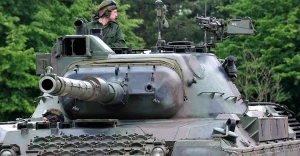
Putin cannibalizes Russian economy to survive personally – Time
The Russian leader is coming under growing strain to finance his increasingly-expensive war – and there’s a history lesson for how this will all end
Nearly 18 months into the Russian invasion of Ukraine, amidst Prigozhin’s failed coup attempt, battlefield setbacks, and global diplomatic condemnation Putin’s financial lifeline has his merciless cannibalization of Russian economic productivity – Yale University’s economists Jeffrey Sonnenfeld and Steven Tian say in their article for Time.
“He has been burning the living room furniture to fuel his battles in Ukraine, but that is now starting to backfire amidst a deafening silence and dearth of public support,” the authors say.
Energy prices, including oil and natural gas, are now lower than before the invasion, as are corn, wheat, lumber, metals, and nearly every product produced by Russia. With undesirable Russian Urals oil trading at a continuous discount, Russia is now just breaking even on oil sales amid reduced commodity prices across the board, thanks in part to the effective G7 oil price cap. In short, the world has now largely replaced Russian supplies, therefore commodity exports are not currently profitable to a desperate Russia.
It is frequently overlooked that Putin is financing his invasion of Ukraine not merely through marginal commodity exports or sanctions evasion, but also through cannibalizing Russia's productive economy.
“As an extractive authoritarian dictator with state control over 70% of the economy, Putin will never really run out of money since he can always pull the authoritarian equivalent of finding money under the couch, or pull a schoolhouse bully act and shake down kids (i.e. oligarchs) for their lunch money at recess time,” the article says.
Putin has levied draconian “windfall taxes” on basically anything that moves. Similarly, the Russian leader has abandoned all pretense of fiscal responsibility, running record budget deficits, printing record sums of money out of thin air, forcing Russian banks and individuals to buy near-worthless Russian debt.
It's no surprise that disgruntled elites like oligarch Oleg Deripaska have resorted to complaining to the press while labor strikes rage across Russia.
Some, like Deripaska, even argue that Putin’s shakedowns are hurting the Russian economy even worse than western sanctions. And on top of sanctions, with over 1,000 western companies leaving Russia practically overnight
“Amidst such undisguised plundering of the Russian economy, stripping it down for war toys, it is perhaps no surprise that Prigozhin’s failed putsch this past weekend revealed no lost love for Putin domestically from the Russian populace and elites,” the media outlet points out.
There is a historical pattern. Both of Russia's main revolutions in the last century were fueled by crippling economic troubles created in part by military excess and losses on the battlefield. Wars are never cheap: economists estimate that Russia's military efforts cost at least $1 billion each day to maintain.
Similarly, before Tsar Nicholas II's abdication in 1917, Russia was devastated by over 100 labor strikes and extensive famine, exacerbated by both forced conscription and returning combat veterans. Prior to the Soviet Union's collapse, the rising costs of the Cold War, along with low oil prices and a severe recession, destroyed the Soviet economy from within.
“Losing wars seems to go hand-in-hand with economic morass and regime change in Russia,” the economists, who authored the article, conclude.
- News














































